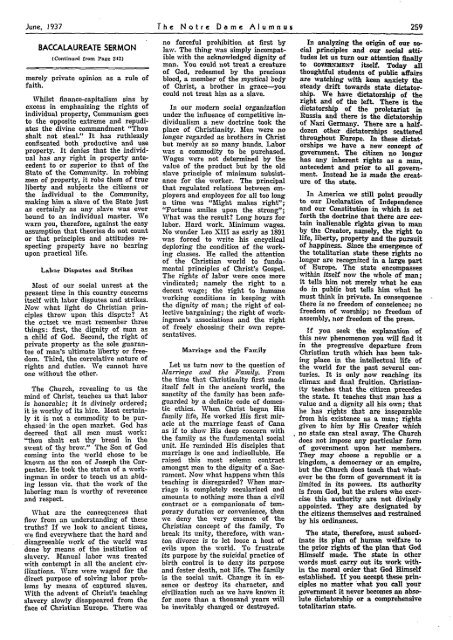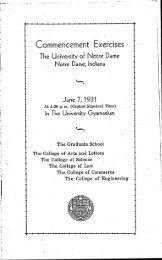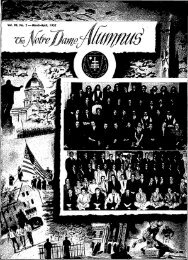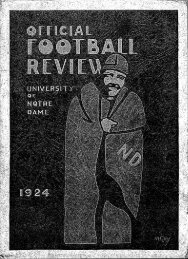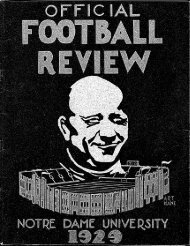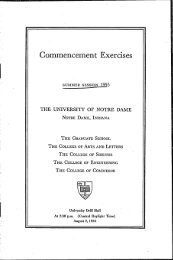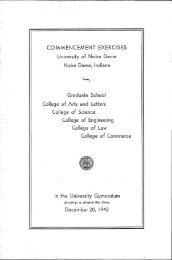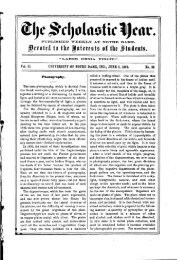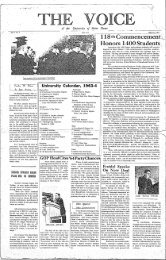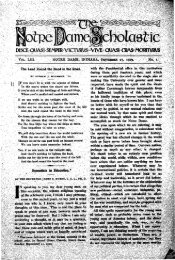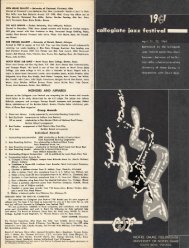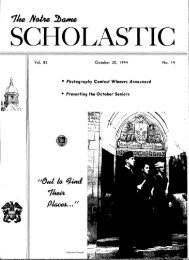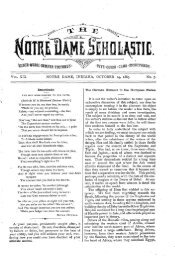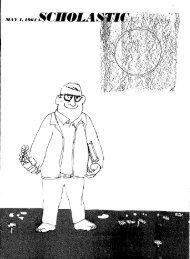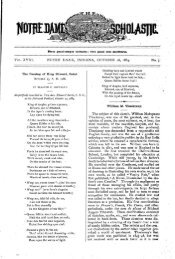Catholic Lawyers' Guild Progresses - Archives - University of Notre ...
Catholic Lawyers' Guild Progresses - Archives - University of Notre ...
Catholic Lawyers' Guild Progresses - Archives - University of Notre ...
You also want an ePaper? Increase the reach of your titles
YUMPU automatically turns print PDFs into web optimized ePapers that Google loves.
June, 1937 The <strong>Notre</strong> Dame Alumnus 259<br />
BACCALAUREATE SERMON<br />
(Continued from Page 242)<br />
merely private opinion as a rule <strong>of</strong><br />
faith.<br />
Whilst finance-capitalism sins by<br />
excess in emphasizing the rights <strong>of</strong><br />
individual property, Communism goes<br />
to the opposite extreme and repudiates<br />
the divine commandment "Thou<br />
shalt not steal." It has ruthlessly<br />
confiscated both productive and use<br />
property. It denies that the individual<br />
has any right in property antecedent<br />
to or superior to that <strong>of</strong> the<br />
State <strong>of</strong> the Community. In robbing<br />
men <strong>of</strong> property, it robs them <strong>of</strong> true<br />
liberty and subjects the citizens or<br />
the individual to the Community,<br />
making him a slave <strong>of</strong> the State just<br />
as certainly as any slave was ever<br />
bound to an individual master. We<br />
warn you, therefore, against the easy<br />
assumption that theories do not count<br />
or that principles and attitudes respecting<br />
property have no bearing<br />
upon practical life.<br />
Labor Disputes and Strikes<br />
Most <strong>of</strong> our social unrest at the<br />
present time in this country concerns<br />
itself with labor disputes and strikes.<br />
Now what light do Christian principles<br />
throw upon this dispute? At<br />
the outset we mast remember three<br />
things: first, the dignity <strong>of</strong> man as<br />
a child <strong>of</strong> God. Second, the right <strong>of</strong><br />
private property as the sole guarantee<br />
<strong>of</strong> man's ultimate liberty or freedom.<br />
Third, the correlative nature <strong>of</strong><br />
rights and duties. We cannot have<br />
one without the other.<br />
The Church, revealing to us the<br />
mind <strong>of</strong> Christ, teaches us that labor<br />
is honorable; it is divinely ordered;<br />
it is worthy <strong>of</strong> its hire. Most certainly<br />
it is not a commodity to be purchased<br />
in the open market. God has<br />
decreed that all men must work:<br />
"thou shalt eat thy bread in the<br />
sweat <strong>of</strong> thy brow." The Son <strong>of</strong> God<br />
coming into the world chose to be<br />
known as the son <strong>of</strong> Joseph the Carpenter.<br />
He took the status <strong>of</strong> a workingman<br />
in order to teach us an abiding<br />
lesson viz. that the work <strong>of</strong> the<br />
laboring man is worthy <strong>of</strong> reverence<br />
and respect.<br />
What are the consequences that<br />
flow from an understanding <strong>of</strong> these<br />
truths? If we look to ancient times,<br />
we find everywhere that the hard and<br />
disagreeable work <strong>of</strong> the world was<br />
done by means <strong>of</strong> the institution <strong>of</strong><br />
slavery. Manual labor was treated<br />
with contempt in all the ancient civilizations.<br />
Wars were waged for the<br />
direct purpose <strong>of</strong> solving labor problems<br />
by means <strong>of</strong> captured slaves.<br />
With the advent <strong>of</strong> Christ's teaching<br />
slavery slowly disappeared from the<br />
face <strong>of</strong> Christian Europe. There was<br />
no forceful prohibition at first by<br />
law. The thing was simply incompatible<br />
with the acknowledged dignity <strong>of</strong><br />
man. You could not treat a creature<br />
<strong>of</strong> God, redeemed by the precious<br />
blood, a member <strong>of</strong> the mystical body<br />
<strong>of</strong> Christ, a brother in grace—^yott<br />
could not treat him as a slave.<br />
In our modem social organization<br />
under the influence <strong>of</strong> competitive individualism<br />
a new doctrine took the<br />
place <strong>of</strong> Christianity. Men were no<br />
longer regarded as brothers in Christ<br />
but merely as so many hands. Labor<br />
was a commodity to be purchased.<br />
Wages were not determined by the<br />
value <strong>of</strong> the product but by the old<br />
slave principle <strong>of</strong> minimum subsistance<br />
for the worker. The principal<br />
that regulated relations between employers<br />
and employees for all too long<br />
a time was "Might makes right";<br />
"Fortune smiles upon the strong";<br />
What was the result? Long hours for<br />
labor. Hard work. Minimum wages.<br />
No wonder Leo XIII as early as 1891<br />
was forced to Avrite his encyclical<br />
deploring the condition <strong>of</strong> the working<br />
classes. He called the attention<br />
<strong>of</strong> the Christian world to fundamental<br />
principles <strong>of</strong> Christ's Gospel.<br />
The rights <strong>of</strong> labor were once more<br />
vindicated; namely the right to a<br />
decent wage; the right to humane<br />
working conditions in keeping with<br />
the dignity <strong>of</strong> man; the right <strong>of</strong> collective<br />
bargaining; the right <strong>of</strong> w^orkingmen's<br />
associations and the right<br />
<strong>of</strong> freely choosing their own representatives.<br />
Marriage and the Family<br />
Let us turn now to the question <strong>of</strong><br />
Marriage and the Faintly. From<br />
the time that Christianity first made<br />
itself felt in the ancient world, the<br />
sanctity <strong>of</strong> the family has been safeguarded<br />
by a definite code <strong>of</strong> domestic<br />
ethics. When Christ began His<br />
family life. He worked His first miracle<br />
at the marriage feast <strong>of</strong> Cana<br />
as if to show His deep concern with<br />
the family as the f-ondamental social<br />
unit. He reminded His disciples that<br />
marriage is one and indisoUuble. He<br />
raised this most solemn contract<br />
amongst men to the dignity <strong>of</strong> a Sacrament.<br />
Now what happens when this<br />
teaching is disregarded? When marriage<br />
is completely secularized and<br />
amounts to nothing more than a civil<br />
contract or a companionate <strong>of</strong> temporary<br />
duration or convenience, then<br />
we deny the very essence <strong>of</strong> the<br />
Christian concept <strong>of</strong> the family. To<br />
break its unity, therefore, with wanton<br />
divorce is to let loose a host <strong>of</strong><br />
evils upon the world. To frustrate<br />
its purpose by the suicidal practice <strong>of</strong><br />
birth control is to deny its purpose<br />
and foster death, not life. The family<br />
is the social unit. Change it in essence<br />
or destroy its character, and<br />
civilization such as we have known it<br />
for more than a thousand years will<br />
be inevitably changed or destroyed.<br />
In analyzing the origin <strong>of</strong> oar social<br />
principles and onr social attitudes<br />
let us turn our attention finally<br />
to GOVEHNMENT itself. Today all<br />
thoughtful students <strong>of</strong> public affairs<br />
are watching %vith keen anxiety the<br />
steady drift towards state dictatorship.<br />
We have dictatorship <strong>of</strong> the<br />
right and <strong>of</strong> the left There is the<br />
dictatorship <strong>of</strong> the proletariat in<br />
Russia and there is the dictatorship<br />
<strong>of</strong> Nazi Germany. There are a halfdozen<br />
other dictatorships scattered<br />
throughout Europe. In these dictatorships<br />
we have a new concept <strong>of</strong><br />
government. The citizen no longer<br />
has any inherent rights as a man,<br />
antecedent and prior to all government.<br />
Instead he is made the creature<br />
<strong>of</strong> the state.<br />
In America we still point proudly<br />
to our Declaration <strong>of</strong> Independence<br />
and our Constitution in which is set<br />
forth the doctrine that there are certain<br />
inalienable rights given to man<br />
by the Creator, namely, the right to<br />
life, liberty, property and the pursuit<br />
<strong>of</strong> happiness. Since the emergence <strong>of</strong><br />
the totalitarian state these rights no<br />
longer are recognized in a large part<br />
<strong>of</strong> Europe. The state encompasses<br />
%vithin itself now the whole <strong>of</strong> man;<br />
it tells him not merely what he can<br />
do in public but tells him what he<br />
must think in private. In consequence<br />
there is no freedom <strong>of</strong> conscience; no<br />
freedom <strong>of</strong> worship; no freedom <strong>of</strong><br />
assembly, nor freedom <strong>of</strong> the press.<br />
If you seek the explanation <strong>of</strong><br />
this new phenomenon you wU find it<br />
in the progressive departure from<br />
Christian truth which has been taking<br />
place in the intellectual life <strong>of</strong><br />
the world for the past several centuries.<br />
It is only now reaching its<br />
climax and final fruition. Christianity<br />
teaches that the citizen precedes<br />
the state. It teaches that man has a<br />
value and a dignity all his own; that<br />
he has rights that are inseparable<br />
from his existence as a man; rights<br />
given to him by His Creator which<br />
no state can steal away. The Church<br />
does not impose any particular form<br />
<strong>of</strong> government upon her members.<br />
They may choose a republic or a<br />
kingdom, a democracy or an empire,<br />
but the Church does teach that whatever<br />
be the form <strong>of</strong> government it is<br />
limited in its powers. Its authority<br />
is from God, but the rulers who exercise<br />
this authority are not divinely<br />
appointed. They are designated by<br />
the citizens themselves and restrained<br />
by his ordinances.<br />
The state, therefore, must subordinate<br />
its plan <strong>of</strong> human welfare to<br />
the prior rights <strong>of</strong> the plan that God<br />
Himself made. The state in other<br />
words must carry out its work within<br />
the moral order that God Himself<br />
established. If you accept these principles<br />
no matter what you call your<br />
government it never becomes an absolute<br />
dictatorship or a comprehensive<br />
totalitarian state.


